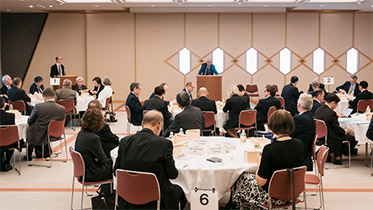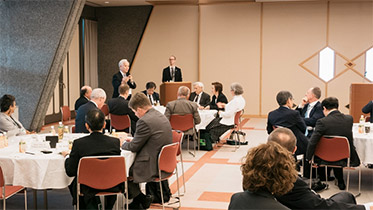News & Topics
The 10th Funding Agency Presidents’ Meeting
October 25, 2019
As part of the STS Forum, a major international science and technology conference held annually in Kyoto, JST in cooperation with German Research Foundation DFG hosted the 10th Funding Agency Presidents’ Meeting.
The theme of this year’s FAPM was the ethical, legal and social implications of research, and how critical social science perspectives can be integrated into research funding programmes to minimize the potential negative impacts of emerging technologies including A.I. and biotech. It was attended by 42 funding organization representatives from 23 countries/regions.
The meeting was opened with comments from JST president Dr. Michinari Hamaguchi, who restated the importance of the 1999 “Declaration on Science and the use of Scientific Knowledge” and the role science plays in serving society, and DFG president Prof. Dr. Peter Strohschneider, who pointed out the continued relevance of the “Collingridge dilemma”* and the question of whether risk containment or risk avoidance was more suitable to enable ground-breaking research that was at the same time responsive towards societal preferences. Special guest Dr. Rush D. Holt Jr., immediate former president of AAAS, looked back to the aspirations of S&T research in 1945, and questioned whether 75 years later our science is actually helping to empower citizens.
Table discussions followed on key questions regarding how ethics considerations could be implemented at each stage of the R&D process, and how the needs of various stakeholders could be more effectively reflected. Table reporters presented a range of insights including: that research funding should consider social and environmental impact as priorities from the outset, e.g. if funding plastic, should make sure it is biodegradable plastic; that ethics is an individual responsibility that should be promoted through researcher training, but also needs strong leadership and an international environment of responsible conduct; that progress must be made in a holistic manner, breaking academic and social silos to bring both science and technology to citizens and citizens to science and technology.
The meeting closed with a proposal for next year’s meeting, ‘public trust in science’.
*impacts of a new technology cannot be fully understood until the technology is introduced, but after the technology becomes widespread the impacts are difficult to control.

DFG president Prof. Dr. Strohschneider gives his opening presentation.

JST president Dr. Hamaguchi reports on his table’s discussion outcomes.
